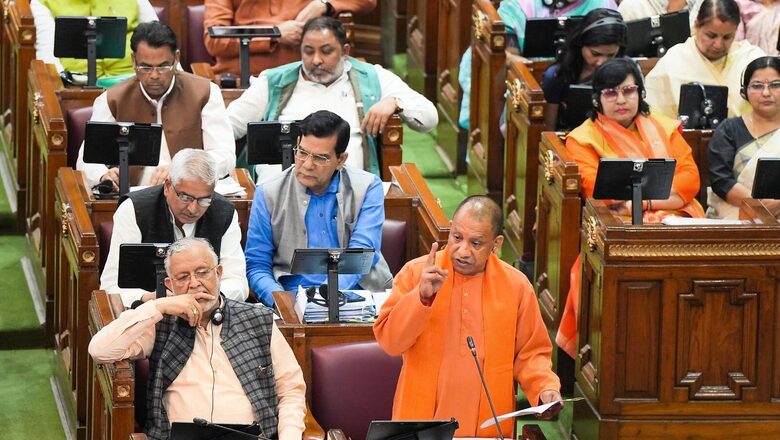
views
Political experts strongly believe that the BJP is against a caste census as it might hamper the saffron party’s goal of mobilising Hindus. Academics are strongly opposed to caste politics and called it a tool to further divide society on the basis of caste and sects so as to gain political mileage.
On February 23, the demand for a caste census gained momentum on February 23 when the opposition Samajwadi Party raised the long-pending issue in the state legislative assembly looking for a clear answer from the Yogi Adityanath-led government.
“If Bihar can have a caste census, why can’t we? Our party had promised that if voted to power, we will complete the caste census within three months,” said former chief minister Akhilesh Yadav during the budget session.
Responding to Yadav, state agriculture minister Surya Pratap Shahi had said, “The subject of the census had been listed at serial number 69 of the Union List of the Seventh Schedule of the Constitution of India. The union government has enacted the Census Act, 1948, and Census Rules, 1990. The subject of holding a census was within the purview of the union government, not the state.”
Shahi added, “UP is way ahead of Bihar. We will not make (a) Bihar out of UP. We would not return to the same path.”
His prompt reply, however, failed to convince the opposition and SP leaders squatted on the floor and interrupted the session by staging a dharna, which eventually led to the adjournment of the ‘question hour’ for more than half an hour.
The question is why the SP is raising this issue now and, that too, when the party had been in power in UP for several years and never thought of carrying out the caste census then. “It is just a bid to gain political mileage ahead of 2024 Lok Sabha polls,” political experts were quick to reply.
Other than being the most populous state, UP is home to over 75 other backward castes (OBC) and 66 scheduled castes (SC) and other sub-castes. Only some, including Yadav, Kurmi, Lodh, Rajbhar, Maurya and Kushwaha, among the OBCs, and Jatav, Pasi, Valmiki and Kori among the SCs have been able to get visibility, with a lion’s share in political power, economic resources and government jobs.
Not only this, OBCs and SCs together account for around 60 to 70 percent of the state’s entire population, said Shashikant Pandey, head of the department of political science at Babasaheb Bhimrao Ambedkar University in Lucknow, while explaining the caste matrix.
The professor said the tabulation of the SC-ST population was done at the time of the population census but caste-wise enumeration was last conducted in 1931, and the same data was being used for giving references to date.
In UP, the SP has been the most vociferous in raising the demand for a caste census. “The very idea behind holding a caste census is to maintain transparency. Unless you have the figures, data and basis for the allocation of resources, policy making will remain ineffective. Things in the northeast (NE) have changed drastically after it started getting a separate share in the union budget when the region was identified as a separate category that needs to be boosted. In the same way, there is a need to carry out caste census, which is an old demand and nothing out of the blue,” said Abhishek Mishra, a senior SP leader while speaking about the demand for a caste census.
“A caste-wise tabulation of census is necessary to achieve the objective of social justice because without knowing the numerical strength of different castes, it is not possible for governments to plan and execute welfare policies for them in the right way,” said SP spokesperson Rajendra Chaudhary.
Other small regional outfits, including Anupriya Patel’s Apna Dal, Om Prakash Rajbhar’s Suheldev Bharatiya Samaj Party (SBSP) and Sanjay Nishad’s Nishad Party, Keshav Dev Maurya’s Mahan Dal and Babu Singh Kushwaha’s Jan Adhikar Party – led by OBC leaders – vocally support the demand for a caste-based census.
The Bahujan Samaj Party (BSP) and the Rashtriya Lok Dal (RLD) are probably the only important political players yet to take a clear stand on this issue.
In the backdrop of increasing demand for a caste-based census, political scientists, however, strongly believe that it is nothing but a tool to gain political mileage and further divide society on caste lines.
“This is actually very unfortunate when we hear about such demands. Why can’t political parties instead of dividing people on the basis of caste think of oneness and togetherness? Now is the time for political parties to change their ideology and instead of disintegrating people to gain political mileage, they should think of uniting people,” said SK Dwivedi, former head of department of political science at University of Lucknow.
Dwivedi said it had been observed that at a social level, caste discrimination was waning as people could be seen mingling but political parties strengthened this issue from time to time for political gain.
He further said if carried out, the caste census could be of great benefit to the government while planning and allocating welfare funds, thus connecting OBCs and SCs to the mainstream of development. But, at the same time, it could also intensify caste tension in society, he added.
BJP’s parental organisation, the RSS, has always stressed upon the unity of Hindus but any caste division will hamper its goal, Dwivedi said. It is for the same reason, the ruling party is in a fix over a caste census whereas it is already in progress in the neighbouring state of Bihar.
Read all the Latest Politics News here

















Comments
0 comment